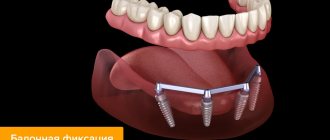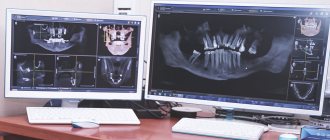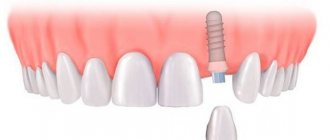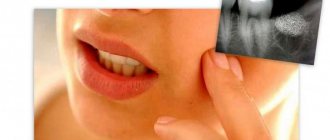Thanks to express (or bloodless) dental implantation, they can be restored with minimal surgical intervention. To get a new tooth exactly like a natural one, with a lifetime guarantee, you do not need to cut the gum or form a canal in the bone. There is no need to wait for gum regeneration or fixation of an artificial root in it. Bloodless installation of screw implants is performed through a puncture under local anesthesia. Therefore, the tissues are damaged insignificantly and quickly adapt to the load - from a temporary crown, which immediately restores the aesthetics of the oral cavity.
What does the manufacturer guarantee?
The warranty period for the integrity of the implant varies from manufacturer to manufacturer. Moreover, premium implants come with a lifetime warranty. Such products are very expensive.
Titanium implants from the mid-price segment are usually guaranteed for 10-25 years. Agree, the gap is very large. However, much here depends not so much on the quality of the implant, but on the prestige of the manufacturer.
Finally, the most inexpensive economy-class implants have a warranty period of 10 to 15 years.
However, in practice, everything does not look so rosy. The fact is that an economy class implant in one patient may last a lifetime, while in another patient a premium class implant may be rejected several months after surgery.
It should be understood that if the implant breaks due to a defect, the manufacturer will replace it. If the breakdown occurred due to the fault of the patient or the surgeon, then in this case the manufacturer will not replace the implant free of charge.
Practice shows that if the implant has served for one year, then its quality corresponds to the declared one and there is no longer any need to fear breakage. The main thing is to follow your doctor’s recommendations to avoid possible implant rejection.
Cost of services
You can find out more about installing dental implants in the Northern Administrative Okrug, North-East Administrative Okrug in the medical district by phone.
| Consultation on Digital Smile Design technology | for free |
| Taking impressions | 840 rubles |
| Wax modeling of one tooth Wax-up | from 1,440 to 1,800 rubles |
| Trying on a Moc-up model | 420 rubles |
| Consultation with an implantologist | for free |
| Straumann implant (depending on implant type) | from 51,600 to 78,000 rubles |
| Shaper Straumann | from 6,210 to 7,410 rubles |
| Sinus lift, closed without taking into account bone tissue | 12,420 rubles |
| Sinus lift, open without bone tissue | 24,840 rubles |
Attention! Prices listed on this page may differ from current prices. Check the cost of services at the clinic!
What does the clinic guarantee?
It is clear that the dental clinic cannot guarantee the quality of the implant. However, it provides a guarantee for the successful completion of the operation. Typically, the duration of such a guarantee ranges from one to two years. It should be emphasized that the guarantee is given only for the installation of a titanium root.
Practice shows that the risk of implant rejection remains for two years after implantation. Apparently, this is why clinics give a two-year guarantee on their work. As for rejection, this often happens due to a violation of the implantation technology. However, there are cases when the patient’s body rejected the implant for no apparent reason.
Statistics show that the cause of inflammatory processes that occur in the first weeks or months after surgery is a medical error or simply the surgeon’s negligence.
The failure of the implant to take root most often occurs due to the surgeon’s lack of proper experience. An unsterile instrument, an error in choosing the type of implant, or rough drilling of the bone - all this can lead to rejection of the titanium root.
At the same time, if implant rejection occurs after three to five years, then this is not the fault of the dental surgeon. Practice shows that the patient himself is to blame for this; he did not fully follow the surgeon’s recommendations, and they are always given in the most detailed form. Also, later implant rejection can occur due to emerging diseases.
Unfortunately, obtaining compensation in the event of implant failure is very, very difficult, if not impossible.
What guarantees are there for dental implantation?
There are two types of warranty for dental implants:
- Manufacturer - the manufacturer of the structure undertakes to supply high-quality analogues of roots without technical defects, which do not contain hazardous substances, and have the correct shape. The company may have special requirements for dental implantation, which the clinic must comply with. In case of complications that occur due to defects in the implanted structure or osseointegration that has not occurred, the manufacturer guarantees the replacement of products and payment for the patient’s treatment. But guilt must be proven, a cause-and-effect relationship must be established.
- Clinics - a guarantee for dental implants implies an obligation to provide quality services, the list of which is prescribed in the contract. If the artificial root does not take root within 5 years, the doctor will redo the work free of charge. But in order for the clinic’s guarantee to work, it is necessary to fulfill a number of conditions - follow all recommendations before and after the implantation operation, attend preventive examinations and do professional hygiene at least 2 times a year, if crown mobility appears, immediately come for an appointment.
Duration of service of a dental crown on an implant
The service life of a dental crown installed on a titanium implant primarily depends on the material from which it is made. Thus, metal-plastic crowns last from two to three years. The reason for such a short service life is the fragility of the plastic. It reacts to temperature changes and excessive mechanical stress. As a result, cracks appear on the surface of the crown, which gradually increase in size. Food debris with many microorganisms accumulate in these cracks. As a result, the plastic coating of the crown is destroyed
You also need to keep in mind that plastic quickly loses its original color.
Metal-ceramic crowns are much better in every way. They serve for at least 10 years. However, they may become chipped if the patient eats very hard foods.
The most durable crowns that are installed on titanium implants are those made from zirconium dioxide. Such crowns last at least 15 years.
If a crown wears out, it does not mean that the titanium rod needs to be removed from the jawbone to replace it. The new crown is installed in the same place where the worn crown was.
Medical corporatism
A dental surgeon specializing in the field of dental implantology has the right to install dental implants. The competence of the health worker is confirmed by the following documentation:
- diploma of higher medical education, mastery of the specialty “Dentistry”;
- a state-issued diploma, a certificate of the existing specialty “Surgical Dentistry”;
- a certificate confirming the assignment of a specialty in “Dental Implantology” (together with a state-issued diploma).
Such documentation should be presented to patients if they wish to familiarize themselves with its contents. In the absence of such documents, the institution cannot legally engage in implantology. For the convenience of visitors, it is recommended that all necessary diplomas and certificates be posted in the reception area, where anyone can familiarize themselves with their contents.
An implantologist must have a diploma (certificate) confirming the fact that he has completed training in installing implants of the system offered to the patient.
The truth of life is that the patient is often perceived as a person from whose possible complaints doctors strive to protect themselves in all acceptable ways. To avoid unpleasant consequences, they try to sort out even obvious mistakes in a narrow circle, without allowing publicity, or the dissatisfied person going to court or to representatives of the press.
It is important to understand the following - experts, whose task is to assess the harm caused to the patient, the degree of non-compliance of the medical care provided with current standards and norms, belong to a common system with doctors. The reality of the existence of “medical corporatism”, hiding behind eloquent slogans, has long been proven.
In the territory of the post-Soviet space, the average person is in every possible way convinced that doctors are always right, and medicine is a field behind which great scientific research stands. All this makes it possible to mislead the opinion of the public and clinic visitors, who do not want to remember the existing right to dissatisfaction with the services provided.
All of the above is not intended to doubt the integrity of all doctors without exception.
The emphasis is on the following - the association of doctors in certain organizations, their interaction, not limited by the work environment, leads to the fact that the patient risks becoming a lonely fighter with several authorities, and not with an individual specialist who has violated his legal rights.
It is useful for a patient who has decided to undergo dental implantation to have important information regarding this procedure. Before starting treatment, you should make sure that the work of the medical institution complies with Russian legislation and whether its employees have the necessary qualifications.
The main requirement for implantable implants is the purity of the material from which they are made (titanium). Compliance with this condition guarantees the successful completion of the procedure in 99% of cases.
Important requirements include:
- the presence of a rough surface on the prosthesis, which increases its area;
- sufficient level of survival;
- sterility of the implant, absence of any foreign inclusions on its upper part;
- versatility.
The last point consists both in the availability of implants of various sizes, corresponding to various clinical conditions, and in the possession of a wide range of abutments, which are supragingival parts of various shapes and sizes that imitate treated teeth.
Compliance of dental services with all the described requirements becomes the key to successful surgery even in difficult conditions, implementation of high-quality modern prosthetics, and extension of the life of dentures.
Mukhin Oleg Igorevich Dentist-surgeon
What determines the success of implantation and the long service life of the implant?
Unfortunately, it often happens that after successful implantation of a titanium implant and installation of a crown on it, the patient shows excessive self-confidence and begins to violate the recommendations of the dental surgeon. The most common mistake is a careless attitude to oral hygiene. Many people believe that microorganisms cannot settle on a denture, which means that artificial teeth cannot be cleaned as thoroughly as natural ones.
In fact, this is not entirely true. Indeed, artificial crowns are not susceptible to caries, but deposits form on them. They contain bacteria that cause inflammation of the gums near the inserted tooth. This is what can cause the titanium rod to be rejected.
In general, the success of implantation and the durability of the entire structure depend both on the skill of the surgeon and on the patient himself and his state of health.
Diagnostics and dental treatment
The main goal of the diagnosis is to help the specialist install the implant as carefully as possible - it should not affect neighboring implants and teeth, as well as important anatomical locations such as the mandibular nerve or the maxillary cavity in the upper jaw.
To achieve maximum accuracy and avoid negative consequences, the doctor makes a diagnosis: he carries out three-dimensional planning of implantation using special equipment - a 3D computer tomograph.
A three-dimensional tissue model allows all manipulations and measurements to be carried out in advance in the office, on a computer, and not in the situation of a surgical wound. This allows the doctor to quickly and accurately install the implant during the operation itself.
The Lancet clinic uses titanium implants from different manufacturers. Some of the best in the world are Swiss implants, considered third-generation dentures. They are made of titanium - a material that takes root very well, since the body does not reject it, accepting it as its own. When using such dental implants, patients are maximally protected from cases of rejection and various other complications.
The Lancet dental clinic practices two methods of tooth restoration:
- One-stage implantation - this procedure is performed immediately after surgery. One-stage implants differ from two-stage implants in the monolithic nature of the “implant-abutment” design, which significantly reduces treatment time. The crown is fixed 3–5 days after installation.
- Two-stage implantation is the most common technique. This is a procedure with delayed implant installation, that is, after complete tissue healing. The dental implant and abutment are installed in stages.
We offer our patients turnkey implantation, which includes both an initial examination, that is, diagnostics and planning on a 3D tomograph, and all stages of implant installation, manufacturing and fixation of the crown.
Institut Strauman AG, 2020. All rights reserved. Courtesy of the Institute Strauman AG
Restoration of lower jaw teeth occurs using a special technology. In this case, two-stage implantation with delayed installation of a dental implant is most preferable - the crown is fixed after a few months. With such implantation, all risks arising from heavy chewing load are eliminated.
Implantation of the upper teeth is a more complex operation compared to implantation in the lower jaw. The bone in this area of the skull is less dense, so slightly longer implants are needed for stabilization. In addition, there is a risk of damage to the neurovascular bundle in the area of the infraorbital foramen, perforation of the nasal mucosa, which can cause profuse nosebleeds (epistaxis) and the risk of potential infection at the level of the apical part of the implant. To pass the bottom without damaging the mucous membrane, special medical equipment is used.
The basic rule for successful implantation of the upper and lower jaws is a thorough preliminary examination with a study of the anatomy of the maxillofacial area. Read more about the benefits of dental implantation in an interview with the chief physician of the Lancet dental clinic, Dmitry Lancet.
DETAILS: Is it possible to put braces on crowns, implants and filled teeth?
Read more about the benefits of dental implantation in an interview with the chief physician of the Lancet dental clinic, Dmitry Lancet.
The Lancet dental clinic employs a team of doctors with extensive experience in dentistry, true enthusiasts of their profession. In addition, we cooperate only with the best doctors who have not just high, but sometimes unique qualifications. Our specialists are trained abroad and use only innovative and effective technologies.
More information on this topic
How not to make a mistake when choosing a clinic and dentist?
Before you trust a dental surgeon, you should make sure that he is licensed to perform dental implants. In addition, he must have permission from the SES. Take the time to clarify how experienced the specialist is and what reviews there are about his work. Keep in mind that the dental surgeon is required to show the patient his diploma, certificates and certificate of specialization.
As for choosing a clinic, first of all you need to make sure that it is equipped with the most modern dental equipment for dental implantation.
Preparation for implantation
Before implantation begins, a medical examination of the oral cavity, collection and diagnosis are carried out. The specialist finds out the patient’s requirements and wishes. To ensure the feasibility of implantation, he evaluates the quality, height, thickness and contour of the jawbone.
DETAILS: Dental implantation is... What is Dental Implantation?
According to indications, a comprehensive examination is prescribed - targeted and panoramic X-rays, computed tomography, and laboratory tests are performed. If necessary, the patient is examined by highly specialized specialists - periodontist, orthopedist, orthodontist, surgeon, dental therapist.
Taking into account the data obtained, the implantologist draws up a treatment plan and coordinates it with the patient.
Osteoplasty
If there is insufficient volume of the jaw bone and/or a decrease in its density, surgery is performed to restore it. For transplantation, the patient's own tissue or biocompatible synthetic analogues are used.
When can the warranty be voided?
If after surgery the patient does not comply with the mandatory periodicity of examination by the dentist, then all responsibility for the problems that arise lies solely with the patient. In this case, the dentist simply did not have the opportunity to notice negative changes in the patient’s oral cavity in time and prevent the problem that arose.
Also, the guarantee will be void if the implantation was done in one clinic and the treatment in another. Agree, not a single doctor will take responsibility for the probable mistake of his colleague from another clinic. The patient is unlikely to be able to independently figure out which clinic is to blame.
If the patient takes care of the oral cavity negligently or refuses to take medications, the patient will also lose the warranty.
If before the operation the patient hid from the doctor the presence of some chronic disease, and the dental implantation ended in failure, then there can be no question of any guarantee in this case.
Also, the guarantee may be voided if the patient was unable to quit smoking after implantation.
People entitled to free prosthetics
In accordance with the law on social civil protection, the following categories of the population enjoy the right to preferential dental prosthetics:
- Veterans of the Great Patriotic War
- Disabled minors
- Disabled people of the Great Patriotic War
- Veterans of Labor
- Unemployed people of retirement age
- People with a disability group
- Citizens whose income is half the subsistence level
- Participants in the liquidation of the consequences of the accident at the Chernobyl nuclear power plant
- People registered as of January 1, 2005 for free dental prosthetics at a government institution
Additional categories of citizens to receive benefits are determined at the regional level. The Social Protection authorities provide a list of such categories of citizens.
In some regions, free dental prosthetics are provided to citizens of the following categories:
- Veterans of Labor
- Disabled people and veterans of the Great Patriotic War
- Home front workers
- Repressed and rehabilitated citizens
- Old age pensioners
- People with a documented disability group
People of retirement age can take advantage of the opportunity to get free dental prosthetics, but this is not carried out in every region of the Russian Federation.
The issue of providing or denying free dental prosthetics to pensioners is decided by local regional authorities.
In order to find out whether a similar service is provided in the city where the pensioner lives, you need to contact the authorities of the required region.
If it turns out that a decision to provide free dental prosthetics exists, then a special application will be required to be sent to the social protection authorities
If such a service is available, it is provided on a first-come, first-served basis. To register beneficiaries, the medical institution maintains two queues:
- The primary right to free dental prosthetics is enjoyed by disabled people of the Great Patriotic War and veterans, disabled minors and heroes of the Soviet Union.
- Secondary rights are enjoyed by old-age pensioners, people with a disability group, and labor veterans
Preferential out-of-turn dental prosthetics is available in the following cases:
- Malignant disease of the hematopoietic organs
- Oncological diseases of the digestive tract
- Patient after complex gastrointestinal surgery
- Oncological disease of the maxillofacial part of the head
- Loss of teeth after severe trauma
A few words about false advertising
Probably, each of you has come across advertisements about a 100% guarantee on dental implantation or about the lifetime service of dentures and crowns. The authors of such advertising are infinitely far from real dentistry. There simply cannot be any eternal guarantee, if only because no surgeon can guarantee this. No matter how hard the specialist tries, the decisive factor in the durability of the structure will still be the actual condition of the patient’s body.
A lifetime guarantee is indeed given, but not for the fact that the implant will not be rejected by the body, but only for its mechanical integrity.
Initial stage of implantation
The medical institution where dental implantation is planned must meet certain requirements. Before choosing a particular clinic, you need to make sure that the medical staff has sufficient experience in providing such services. Clinic employees need to be prepared to present not only a license to perform dental operations, but also the necessary certificates, diplomas and other documentation.
An important indicator of the high professional level of doctors is the opinion of former patients. Feedback from people who were treated at the clinic will allow you to find out at what level the medical procedures were performed, how fast the healing and rehabilitation were, whether the prosthesis is easy to use, and whether there were any cases of rejection. In addition, it is necessary to take into account the type of implants used and the place of their manufacture.
Before proceeding directly to the procedure, it is important to determine the general health of the patient, his mouth and jaw, and find out whether dental implantation can be performed safely. Before the operation, a preparatory stage is required, which can take from several weeks to a whole month.
How are the first visits to the implantologist going?
First visits to a specialist consist of several stages:
- Determining existing limitations for performing implantation, standard dental examination, studying the condition of teeth and gums. The doctor evaluates the possibility of the operation and determines the future shape and size of the implants. At this stage, the patient is recommended to visit a general practitioner to clarify the presence of pathologies that could prevent the procedure.
- Clarifying the condition of the bone tissue in the area of which the implant will be implanted, determining its main characteristics. The latter are always individual - in some patients the bones are thick and massive, in others they are thin and of small volume. It is possible to find out the peculiarities of their structure by performing an X-ray, which allows one to assess the height, level of bone tissue density, and examine the roots of neighboring teeth (in addition to this type of examination, an orthopantomogram and CT scan are required). After receiving all the necessary results, the doctor will be able to start drawing up a treatment plan and choosing the appropriate types of implants.
- Treatment of teeth and gums. Before performing implantation, you will need to get rid of various dental problems, the list of which includes caries, pulpitis, periodontal disease, and gingivitis. If there are root particles in the bone tissue, they must be removed. Teeth are also removed with maximum preservation of bone tissue (the procedure can be performed shortly before implantation, in parallel with the installation of a prosthesis in the area of the lost tooth).
We invite you to familiarize yourself with Implantation for complete absence of teeth, price in Moscow, implantation for edentulous jaw, turnkey prices
If the implant is planned to be installed in the place of a long-lost tooth, surgical treatment is first performed to address the missing full bone tissue in the area of the void. The absence of loads on the jaw associated with the once existing tooth leads to its “resorption” and gradual thinning.
After the first visit to the doctor, the patient should receive recommendations regarding proper preparation for surgery and oral hygiene. For several weeks before the procedure, you will need to periodically brush your teeth and rinse your mouth with antiseptics.
Contract for the operation
Before the procedure begins, the clinic is obliged to conclude an agreement with the patient for its implementation. In order for implantation to be carried out efficiently, during a preliminary conversation with a specialist, you need to get answers to all your questions on the topic, even the most insignificant ones. This is a full-fledged surgical intervention, which means there can be no trifles in maintaining health after it is performed.
Before signing an agreement with the clinic, you must read it carefully and make sure that everything said in words is spelled out in the text of the agreement.
The contract drawn up at the clinic must be read carefully and completely. Especially the part that concerns the guarantee issued by the clinic if any problems arise during the procedure. It is imperative that you read the contract; the words and assurances of the implantologist alone are not enough.
If the clinic’s statistics indicate a minimal percentage of unsuccessful operations, then a repeat procedure can usually be performed free of charge. The clause on the conditions for re-installation of implants must be specified in the concluded contract.
In order to avoid getting into an unpleasant situation, the client must know his rights and the guarantees of specialists before the implantation begins.










